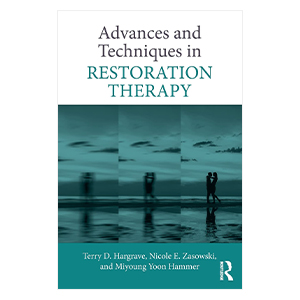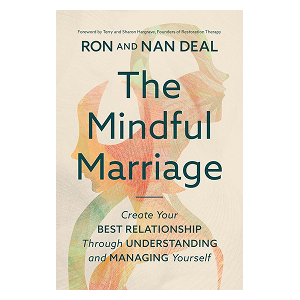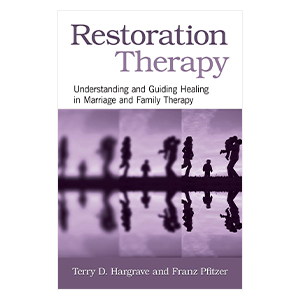Books & Articles
Restoration Therapy
Restoration therapy is a new approach to assessment, treatment and healing in individual, marital and family therapy. It utilizes techniques and theory that help individuals gain clear insight about their identities and perspectives on relationships as well as giving the therapist a cadre of intervention techniques that move individuals into responsible change of persistent and long standing patterns.
Coming from a tradition of Contextual Family Therapy, the Restoration approach provides the therapist with clarity of assessment of individual and relational issues yet utilizes sound mindfulness strategies to produce real and long-lasting systemic change.

Advances and Techniques in Restoration Therapy
Advances and Techniques in Restoration Therapy focuses on the practical elements of the Restoration Therapy Model to help mental health professionals working with individuals, couples, and families, to restore broken identities and senses of safety, and to move toward action that is functional and healing. Richly illustrated with case examples from experienced clinicians, this volume brings new insights and a range of established and emerging therapeutic techniques to the framework and Restoration Therapy community. This is an innovative and much-needed step-by-step manual, which will provide marriage and family therapists and counselors with practical ways of applying key interventions to varied situations of pain, to help clients find functional, healing solutions with integrity.

The Mindful Marriage
Backed by neuroscience and biblical principles, this book delivers a trauma-informed therapeutic model for healthy couples who want a stronger connection and offers deep transformation for couples in troubled relationships so they can stop painful patterns.
When Ron and Nan Deal suffered the devastating loss of their child, their marriage was nearly shattered by their destructive cycles. At wits’ end, they sought the help of pioneering therapists Dr. Terry Hargrave and Sharon Hargrave, LMFT, whose transformational Restoration Therapy has helped millions through the practice of emotional mindfulness.
Now, the Deals and Hargraves introduce readers to this proven method that challenges popular beliefs about how relationships work. They show readers how to better understand themselves in times of emotional distress, so that they can self-regulate. Christian readers will especially appreciate the balance of scientifically proven methods along with Scripturally sound teaching, resulting in more loving, faithful marital relationships.
Articles
- Ahlquist, L. R., & Hargrave, T. D. (2021). Effectiveness of Restoration Therapy in an Intensive Model. The Family Journal. https://doi.org/10.177/10664807211052381
- Hargrave, T.D., & Houltberg, B. (2019). Transgenerational theories and how they evolved into current research and practice. In K. S. Wampler and R. B. Miller (Eds.). Handbook of systemic family therapy, Volume I. New York: Sage.
- Hargrave, T.D. & Yoon Hammer, M. (2016). Restoration therapy. In J. Carlson and S. Dermer (Eds.), Encyclopedia of marriage, family and couples counseling. Thousand Oaks, CA: Sage.
- Yoon Hammer, M. & Hargrave, T.D. (2016). Cognitive maps and couples, In Jon Carlson and Shannon Dermer (Eds.). Encyclopedia of marriage, family, and couples counseling. Thousand Oaks, CA: Sage.
- Yoon Hammer, M. & Hargrave, T.D. (2016). Forgiveness in couples therapy: Expanding compassion, responsibility, and apology. In G. Weeks, S. Fife, and C. Peterson (Eds.), Techniques for the couple therapist: Essential interventions. New York: Routledge.
- Hargrave, T.D. & Yoon Hammer, M. (2016). Restoration of relationships after affairs. In G. Weeks, S. Fife, and C. Peterson (Eds.), Techniques for the couple therapist: Essential interventions. New York: Routledge.
- Hargrave, T. D., & Hammer, M. Y. (2011). Forgiveness and trauma: Working with love, justice, and power for healing. Psyche and Geloof. 22 (2), 102-111.
- Hargrave, T. D. (2010). Restoration therapy: A couple therapy case study. Journal of Psychology and Christianity. 29 (3), 272-277.
